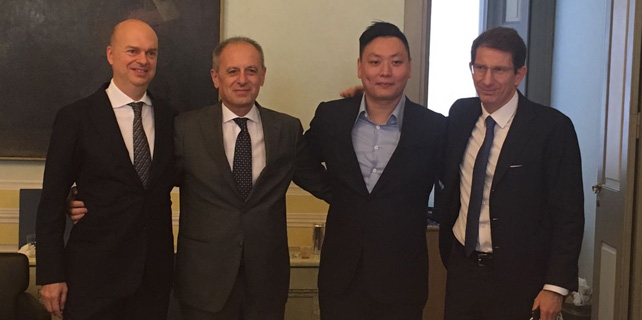Small, cheaper but world-class
Cibei, one of China's "hidden champion" manufacturer of oral and maxillo-facial implants, said it plans to intensify its research and development activities and export its upcoming product upgrades to economies covered by the Belt and Road Initiative.
The Ningbo-based company mainly provides maxillo-facial systems, neurosurgical systems, dental screws and other instruments used in the medical industry.
"One of my friends happened to introduce this industry niche to me, and I thought I can do it, so I started this company in 1995," said Shen Guocheng, the owner of Cibei.
Back then, he used to run a factory that made molds.
In the past, all sophisticated surgical implants were imported from the United States and Europe, where medical instrument giants abound.
"I needed to do my part," he said. That meant, Cibei applied for its first product patent in 2002 after years of research, and tried to cover the nationwide market since 2008.
Currently, its main products, titanium screws and plates, command a 20 percent share of China's high-end medical instruments market, topping the domestic brands list. Sales generated nearly 30 million yuan ($4,4 million) last year.
"It is far from enough," said Shen. "The quality of our products is such they can compete with imported middle- and high-end ones, but cost only one-third of their price. We're a good example of how a small-sized company can compete with international giants in a market sub-segment.
"Yet, we need time to persuade the market to try our products, especially buyers in second- and third-tier cities."
Cibei has almost 50 staff. One-third of them are in research and development. The company invests 15 percent of its annual sales revenue in R&D. This, in turn, ensured annual sales growth of over 10 percent in recent years-a contrast to many Chinese manufacturers who experienced downward pressure on their growth.
In mid-March, the government of Ningbo, a coastal city in Zhejiang province and the hometown of Cibei, introduced 22 policies to support manufacturing companies and to fulfill its role as a national pilot city promoting the "Made in China 2025" strategy.
It is estimated that more than 10 billion yuan ($1.45 billion) will likely flow into the city's manufacturing industry in the next three years, strengthening financial support for scientific innovation.
Companies willing to implement reforms for intelligent manufacturing are eligible for a maximum subsidy of 30 million yuan, according to the new policies.
Through the establishment of special funds, the local government has encouraged the launch of innovation institutes and major scientific and technological projects.
Other elements, such as loans and land for industrial use, have also been taken into consideration.
Some 30 percent of total loans from banks and 35 percent of annual newly approved lands will be allocated to the industry, in accordance with the new policies.
"We are a small company still. And the product development cycle in this field is rather long. The new policies would definitely speed up our effort to meet our goal," said Shen.
"We have exported our products to Southeast Asian counties and countries in the Middle East. And we have several promising and striking products in the final stage of their research. I have confidence that our annual sales growth will reach 30 or even 50 percent then."






















